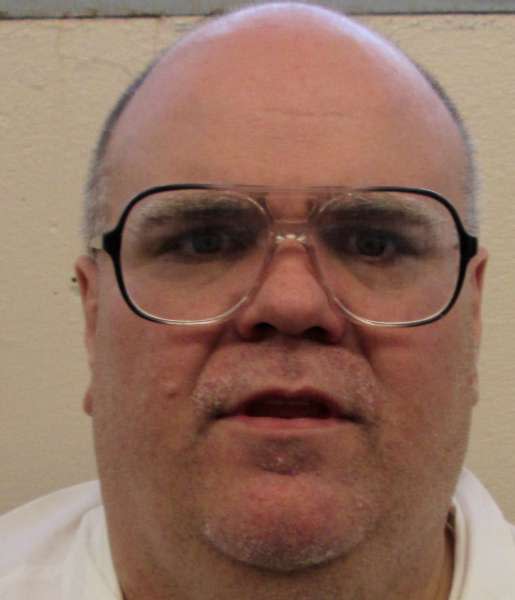Alabama conducts one execution, moves to set two more within a month
Within about a month, Alabama has conducted one execution and laid the groundwork to schedule two others − including its second using nitrogen gas.
The attorney general’s office has requested the Alabama Supreme Court set the execution date for Alan Eugene Miller. Miller's execution would be carried out using nitrogen hypoxia, the AG’s office says. Miller, now 59, was convicted of killing three people during a pair of 1999 workplace shootings in suburban Birmingham. He was living in Autauga County at the time.
"The State of Alabama is prepared to carry out the execution of Miller's sentence by means of nitrogen hypoxia," the attorney general's office wrote, adding that Miller has been on death row since 2000 and that it is time to carry out his sentence.
More: Failed execution details: Smith 'strapped to a gurney' for hours as courts weighed appeals
Miller was set to be executed by lethal injection in September of 2022, but staff could not gain access to his veins for the IV lines before his death warrant expired. Miller said that during the aborted 2022 lethal injection attempt, prison staff poked him with needles for over an hour as they tried to find a vein and at one point left him hanging vertically as he lay strapped to a gurney.
Miller, a delivery truck driver, was convicted in the fatal workplace shootings of Lee Holdbrooks, Scott Yancy and Terry Jarvis. Prosecutors said Miller killed Holdbrooks and Yancy at one business and then drove to another location to shoot Jarvis. Each man was shot multiple times.

Testimony indicated Miller was delusional and believed the men were spreading rumors about him. Jurors convicted Miller after 20 minutes of deliberation and then recommended a death sentence, which a judge imposed.
Alabama and nitrogen hypoxia executions
The state now plans to use its new nitrogen hypoxia method in its second attempt to execute Miller. In that method, the condemned breathes pure nitrogen through a mask. The nitrogen displaces the oxygen in the lungs.
On Jan. 25, Kenneth Eugene Smith became the first person in the nation executed using the method. That execution was carried out in the death chamber at the William C. Holman Correctional Facility in Atmore. In the weeks before the execution, the attorney general’s office wrote in court documents that the inmate would lose consciousness in a matter of “seconds” and die in a matter of minutes.
Smith writhed and shook on the gurney for some four minutes before appearing to lose consciousness. His convulsions shook the gurney several times. He appeared to gasp for air and writhe for about two minutes more after he appeared to lose consciousness before he apparently stopped breathing.
The morning after Smith’s execution Attorney General Steve Marshall described the execution as “textbook” and said the state was ready to carry out more nitrogen hypoxia executions.
Smith's crime and sentencing controversy
Smith was convicted of capital murder on Nov, 14, 1989, in the murder-for-hire plot of Elizabeth Sennett in Colbert County, She was the wife of the Rev. Charles Sennett, who hired Smith and his co-defendant to kill her in an effort to collect on her life insurance policy.
Charles Sennett was in debt at the time. Elizabeth Sennett was stabbed to death in her home. Charles Sennett committed suicide a few days after her death after it became apparent that investigators suspected his involvement.
Smith’s original conviction was overturned, and he was convicted of capital murder again in 1996.

The jury voted 11-1 to recommend a sentence of life in prison without the possibility of parole for Smith, but the judge ignored the jury’s recommendation and handed down the death sentence. At the time, judges in Alabama could override the jury’s recommendation of life without the possibility of parole and enact the death sentence. The Legislature has since removed that power.
Legal dispute over nitrogen executions
Death penalty opponents called Smith’s execution “torture.” A death row inmate has filed a federal lawsuit asking the courts to halt the use of the method. It is unclear if the lawsuit will effect the state supreme court’s setting of Miller’s execution date.
Inmates are allowed to choose the method of their execution. According to Marshall, 43 inmates have chosen nitrogen hypoxia. The prison system did not respond an email asking whether inmates will be given the opportunity to change their decision from nitrogen hypoxia to lethal injection or electrocution, the other two legal means of execution in Alabama.
There are 164 inmates on death row.
Alabama's next planned execution
Four days after Smith’s execution, the AG’s office requested that the state Supreme Court set an execution date for Jamie Mills. The method used for Mills would be lethal injection, court records show. Mills was convicted of capital murder his role in the 2004 murders of Floyd and Vera Hill in Guin in Marion County.
“There is no doubt that Mills committed those offenses,” the AG’s office motion states. “As set out more fully below, Mills’s convictions and sentence are final because he has completed his direct appeal, state post-conviction review, and federal habeas review. Accordingly, it is time for this death sentence to be carried out.”
According to the filing and other court records, Mills and his then common-law wife drove to the residence, and the four of them went to the shed where yard sale items were kept.
Vera Hill and Mill’s wife went back to the residence and that’s when Jamie Mills struck Floyd Hill knocking him to the ground, the motions reads. After the women came back to th shed, Mills hit Vera Hill in the back of the head with a hammer.
Mills stole several items from the couple’s home, that added up to about $140 including a tackle box, pills, purse, and a police scanner, the motion reads.
The Associated Press contributed to this report. Contact Montgomery Advertiser reporter Marty Roney at mroney@gannett.com.
This article originally appeared on Montgomery Advertiser: Alabama conducts one execution, moves to set two more within a month

